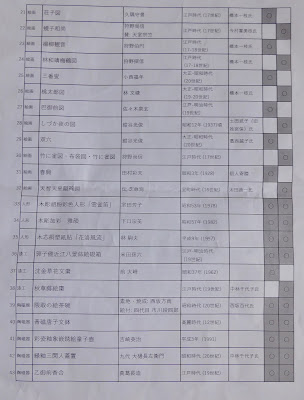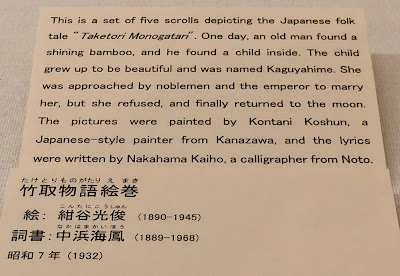目次 / Contents
1) 第二部 / Part 2
2) 展示 / Display
A. 三十六歌仙色紙帖 / Album of the Thirty - six Poets
B. 帝鑑図 / Didactic Illustrations for Emperors
C. 天神図 / Tenjin
D. 掛け軸3点 / 3 Hanging Scrolls
E. 天智天皇蹴鞠図 / The Scene of Football of the Emperor Tenji
3) ポスター / Posters
1) 第二部 / Part 2
金沢市立中村記念美術館 : ★では、企画展:
"時代を映すひとびとの姿 - 《竹取物語絵巻》"は、
《竹取物語絵巻》と美術館の所蔵品から構成されていました。
私のブログに載せる上で、勝手に企画展を
第一部を竹取物語 (チラシ表面)、
第二部を美術館所蔵品 (チラシ裏面)
とに分けました。
あわせて、当館のコレクションから、歴史・文学・宗教・風俗などを題材にした人物画と、心あたたまる人形を展示し、多彩なひとびとの姿をご覧いただける展示としました。"
 |
チラシ Flyer Flyer of "People who reflect the times - 'The Tale of Princess Kaguya Picture Scroll'" |
Part 2
Kanazawa Nakamura Memorial Museum held a special exhibition :
"People who reflect the times -《The Tale of Princess Kaguya Picture Scroll》"
consisted of picture scrolls of the Tale of Princess Kaguya and works from the museum's collection.
In order to put it in my blog, I arbitrarily divided the exhibition into
Part 1 : The Tale of the Bamboo Cutter (front of the flyer) and
Part 2 : Collections of the Museum (back of the flyer).
According to their website, only in Japanese, about the exhibition.
(Translated by me)
"At the same time, from the museum's collection, we exhibited portraits on subjects such as history, literature, religion, and customs, as well as heartwarming dolls, making it an exhibition where you can see the diverse faces of people. "
 |
| 2階平面図 / First Floor |
2) 展示 / Display
展示された中から、私が惹かれた絵画を撮影したので、ここに載せます。
I photographed the paintings that attracted me from the exhibition, so I show you them here.
A. 三十六歌仙色紙帖
Album of the Thirty - six Poets
 |
| "三十六歌仙色紙帖" 、 1802 作 : 住吉 広尚 (1781 -1828) 「百人一首のよう!」 とすぐに思い浮かぶました。 私がこの世界に疎いので、歌集といえば、百人一首!(笑) 三十六歌仙 (サンジュウロッカセン) は、 藤原 公任 (フジワラ キントウ / 966 -1041) によって 平和時代の和歌の名人として選ばれました。 その36人はここで→★ "Album of the Thirty - six Poets", 1802 by Hironao Sumiyoshi (1781 -1828) "It's like 'Hyakunin Isshu!'" I'm not familiar with this world, so when it comes to Waka poetry collections, it's Hyakunin Isshu! (Laugh) "Album of the Thirty -six Poets" : The Thirty-Six Immortals of Poetry : Sanju Rokkasen as masters of Waka poetry during the peace era. The 36 people are here →★ |
B.帝鑑図
Didactic Illustrations for Emperors
 |
| "帝鑑図"、17世紀 "Didactic Illustrations for Emperors" , 17th Century .jpeg)  .jpeg)  .jpeg) |
C. 天神図 / Tenjin
 |
| "天神図 ", 17世紀 "Tenjin", 17th Century  絵に惹かれたというよりも、 '道真公だ' と思って撮影しました。 Rather than being attracted by the picture, I thought it was 'Sugawara no Michizane!' and took the picture.   菅原 道真 (845 -903) が、加賀藩・前田家の祖先だと 初めて知りました。 この日に、前田 利家 (マエダトシイエ/ 1539 - 1536または37) を祀る、尾山神社 (オヤマジンジャ) へ行きました。 その神社に、道真公のシンボルの梅の花をデザインしたものが たくさんあったので、不思議に思いました。 その理由がここでわかりました。  I learned for the first time that Sugawara no Michizane (845 - 903) was an ancestor of the Maeda Clan of the Kaga Domain. On this day, I went to Oyama Shrine, which enshrines Toshiie Maeda (1539 - 1536 or 37). The shrine has many things designed with Ume, the symbol of Michizane, so I wondered about it. I found the reason here. |
According to Wiki about Sugawara no Michizane,
"Sugawara no Michizane ( 845 - 903) was a scholar, poet, and politician of the Heian Period of Japan.
He is regarded as an excellent poet, particularly in Kanshi poetry, and is today revered in Shinto as the god of learning, Tenman-Tenjin (often shortened to Tenjin).
In the poem anthology Hyakunin Isshu, he is known as Kanke, and in kabuki drama he is known as Kan Shōjō."
D. 掛け軸3点 / 3 Hanging Scrolls
 |
"竹に雀", 17世紀 "Sparrows on Bamboo", 17th Century |
 |
"布袋図", 17世紀 "Hotei", 17th Century Hotei (? -917) was a Chinese monk who is often identified with and venerated as Maitreya Buddha in Chan Buddhism. In Japan, he is worshiped as one of the Seven Lucky Gods. |
 |
| "竹に雀"、17世紀 "Bamboo and Sparrow", 17th Century |
E. 天智天皇蹴鞠図
The Scene of Football of the Emperor Tenji
 |
"天智天皇蹴鞠図", 16世紀 "The Scene of Football of the Emperor Tenji", 16th Century This football means Kemari which is an athletic game and Kamakura period (1185 - 1333). |
3) ポスター / Posters
実際の展覧会に行けなくても、イベントに参加できなくても、ポスターを見ると、その土地の文化が少しは理解できるように思います。
Even if I can't go to an actual exhibition or participate in an event, I think I can understand the culture of the place a little by looking at the posters.
 |
| この展覧会の後期の部分は 見ることができました。 I was able to see Part 2 of this exhibition. |





.jpeg)













.jpeg)











.jpeg)










